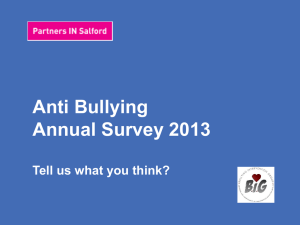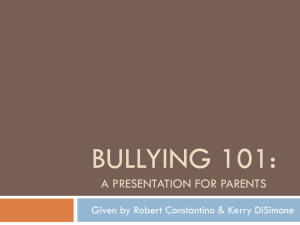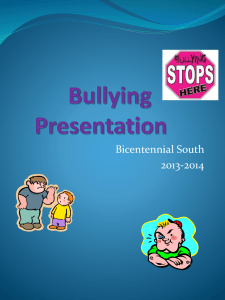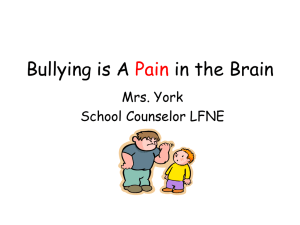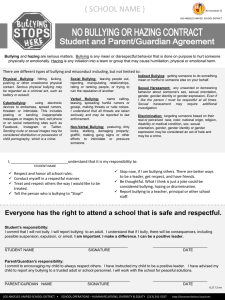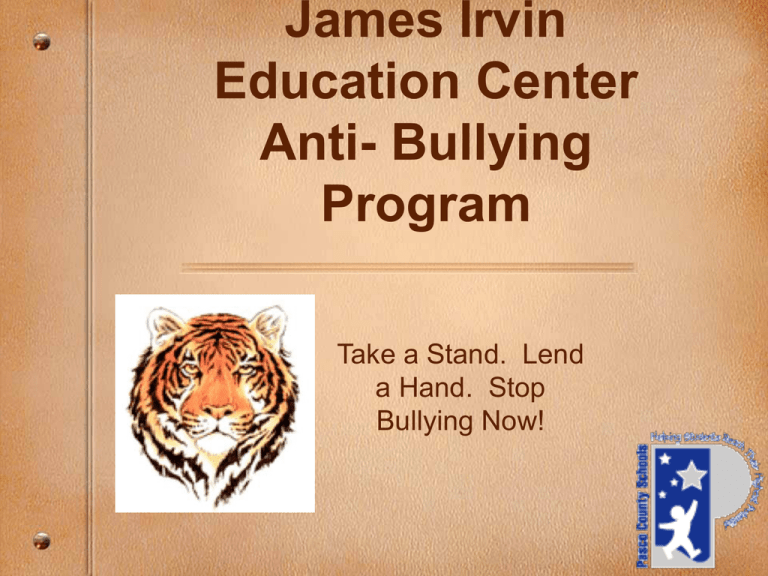
James Irvin
Education Center
Anti- Bullying
Program
Take a Stand. Lend
a Hand. Stop
Bullying Now!
Essential Questions
• How do we define bullying?
• What is the Anti-Bullying program at
JIEC?
Jeffrey Johnston Stand Up for
All Students Act or
1006.147, F.S
• prohibits bullying and harassment of any
student or employee of a public K-12
educational institution;
• provides definitions of bullying and
harassment;
Bullying Defined
• “Bullying occurs when a student or
group of students targets an individual
repeatedly over time, using physical or
psychological aggression to dominate
the victim (Hoover & Oliver, 1996; Rigby,
1995; USDOE, 1998).”
Simply Stated, Bullying
• Is intentionally intimidating or subjecting a person
to hostility or ill treatment.
•
Involves actions which cause another person to feel
afraid, humiliated, embarrassed, threatened, or
shamed.
•
Is repeated over time.
•
Occurs in a relationship in which there is an
imbalance of power.
Bullying…
• is aggressive behavior that intends to
cause harm or distress. Bullying can be
physical, verbal, or emotional.
• usually is repeated over time.
• occurs in a relationship where there is an
imbalance of power or strength.
• P.I.C.= Purposeful, Imbalance of Power,
Continual
What does bullying look
like?
Direct forms of bullying/harassment:
•
•
•
•
•
Easy to recognize
Physical attacks
Extortion
Threats
Public gestures/displays
Indirect forms of bullying/harassment:
•
•
•
•
•
•
Less easy to recognize
Relational and social bullying
Socially-sanctioned and peer-pressured exclusion
Gossip and rumor-spreading
Electronic methods, including cyberbullying, instant
Messaging, email, cell phones
Types of BullyingPhysical
•
•
•
•
•
Hitting, kicking, or pushing
Taking property
Damaging property
Forced or unwelcome contact
Perceived intent to harm
Types of Bullying-Verbal
•
•
•
•
•
Teasing with the intent to hurt/harm
Name calling
Threats against the target
Intimidation
Demeaning jokes, stories or remarks about
another’s differences
• Gossiping
• Spreading rumors that hurt
one’s reputation
Types of Bullying-Emotional
•
•
•
•
•
•
Alienation or exclusion from groups
Manipulation done to harm acceptance into
groups
Damage to reputation
Public humiliation
Creating a sense of unease for
the target
“Flaming” or posting slander to the Internet
(Cyber bullying)
Types of Bullying-Sexual
・Unwanted jokes, comments, or taunts about sexual body parts
・Teasing about sexual orientation or starting rumors about sexual
activities
・Passing unwanted notes or pictures about sex
・Physically intrusive behaviors, such as brushing up against or
grabbing someone in a sexual way or forcing someone to
engage in unwanted sexual behaviors
・Spreading sexual rumors
・Pulling at clothing in a sexual way or pulling clothing down or off
・"Flashing" or "mooning"
But I was just teasing
True or False?
• Bullying is a male
behavior
False
True or False?
• Bullies are easily
spotted because they
are loud, agitated and
aggressive.
False
True or False?
• Most bullying
happens at
school.
True
True or False?
Bullies are insecure and
have low self-esteem.
False
True or False?
• Targets of bullies are
children with physical
differences (overweight,
glasses, etc.).
False
True or False?
Most bullying
involves physical
aggression.
False
True or False?
• Students who are bullies
at age eight are twice as
likely to be convicted of a
crime by age 30.
False
How to Report Bullying
• Report to
–
–
–
–
–
Parents
Teachers
Counselors
Administrators
Adults
• Parents Report to School
• Friends Report for Friends
• Drop a Note in the Lend a Hand Take A Stand
Report Bullying Bully Boxes
Why Report Bullying ?
•
•
•
•
Everyone Has a Right to Feel Safe
Out of Respect for Yourself and Each Other
Concentrate on School Work
Friendly School
What can YOU do when you see
someone being bullied at school?
Think about how YOU might feel if the
bullying was happening to you. You
and other kids can lend a hand, even
when you aren’t close friends with the
kids who are bullied. Our school will
be a better place if you help stop
bullying. Making our school a better
place is EVERYONE’S job.
What else will work?
• Don’t Bully back! It will only make things
worse.
• Tell the bully to stop
• Say kind words to the person who is being
bullied.
• Help them understand that it is not their fault.
• Be a friend
• Tell the person who is being bullied to talk to
an adult about what happened
The Anti-Bullying Discipline
Plan
• The Incident is Reported
A Bully incident is reported in a written or verbal
format- phone call, an incident report turned in
by a student, staff member, teacher, counselor,
administrator, or friend.
• The Incident is Investigated
The bullying behavior/incident is investigated by
a behavior specialist, an administrator, or a
guidance counselor.
The Bully List
• If an incident is
• The information
founded, students
from these
are added to a
investigations is
list.
turned in to the
state at the end of
• Each level of the
every year.
list has
progressive
consequences.
Step .5
–.5 Step Conference with student,
warning and parent contact
(depends on severity of incident)
Step 1 The Bullying Incident
is Founded
• If founded, the bullying student’s parents are contacted
and requested to come in for a conference with an
administrator.
• During that conference, the parents are informed of
their child’s behavior, the school policy, and the
consequences for future infractions.
• The student and parent(s) sign the letter acknowledging
the consequences for this behavior. The student is sent
home for the remainder of the day, and/or is given a
day of ISS.
Step 2
• If a second incident occurs, the student
can receive up to 5 days of OSS, and
attends 4 to 6 weeks of group
counseling targeting aggressive
behaviors and replacement behaviors.
• These groups will be separated into
boys’ groups and girls’ groups, since
aggression usually manifests itself
differently in these groups.
• Parents are informed.
Peer Review
• After attending the required number of
group sessions, the student appears
before the Peer Panel to convey a
change in attitude and behavior. The
panel will review the answers, attitudes,
and findings and report to the
Administration. The Administration will
make a decision as to whether or not
further action may be necessary.
• Parents are informed.
Step 3
• Step 3 A third incident results in 5 to 10
days of OSS and continued participation
in the anti-bully program.
• Students at this level will be watched
very closely and under adult supervision
at all times (Amethyst Card Privileges).
Step 4
• The 4th Incident results in a
recommendation for expulsion or
alternative placement.
• Note: Law Enforcement (SRO) Involved at Any Step at
Request of
Administration or Victim’s Parents.
How can I report a Bullying Incident?
• ALL REPORTS ARE ANONYMOUS – please use
student number, not name.
• Incident report forms can be downloaded from JIEC
homepage
• Report Forms are located in Student Services,
Guidance, and from your teachers
• Reports can be put in the administrator, guidance
counselor, or behavior specialist’s mailbox or inbox
on the door. It may also be given to a teacher,
instructional assistant or any other staff member.
Take a Stand and
Lend a Hand for a BullyFree School.


